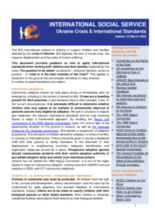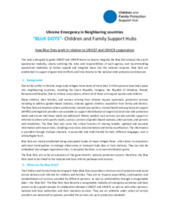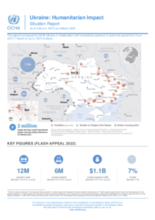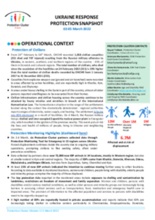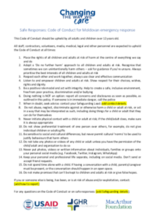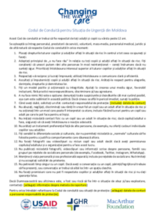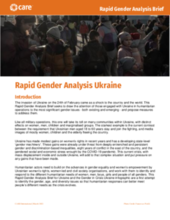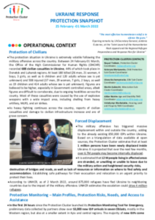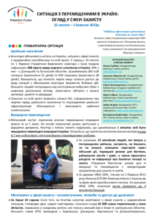Displaying 21 - 30 of 239
This document provides guidance on how to apply international standards when working with children and their families impacted by this crisis. The question to be asked, consistently – whatever decision, action or process – is “what is in the best interests of the child?” This applies to situations on the ground that are complex and allow no easy answers.
This note is designed to guide UNICEF and UNHCR teams on how to integrate the Blue Dot concept into a joint operational modality, clearly outlining the roles and responsibilities of each agency, and recommending operational modalities to further expand and integrate these into the national response. Blue Dots are established in support of government efforts and links directly to the national child protection architecture.
This report is produced by OCHA Ukraine in collaboration with humanitarian partners. It covers the period from 3 p.m. (EET) 7 March to 3 p.m. (EET) 8 March
The Protection Cluster coordinates the protection response and advocates for the improvement of policies and legislation affecting conflict-affected people. It also engages in capacity building and provides guidance on mainstreaming protection into all humanitarian response activities. This is the Protection snapshot for Ukraine for the period 2 - 5 March 2022, compiled by Protection Cluster Ukraine. The Protection Cluster is led by UNHCR and includes Child Protection (led by UNICEF), GBV (led by UNFPA) and Mine Action (led by UNDP) Sub Clusters.
This code of conduct is to be used during the Moldovan emergency response to the Ukrainian crisis. It should be upheld by all adults and children over 12 years old.
Acest cod de conduită urmează să fie utilizat în timpul răspunsului de urgență al Republicii Moldova la criza din Ucraina. Ar trebui să fie susținut de toți adulții și copiii de peste 12 ani.
This Rapid Gender Analysis Brief seeks to draw the attention of those engaged with Ukraine in humanitarian operations to the most significant gender issues both existing and emerging and propose measures to address them.
The Protection Cluster coordinates the protection response and advocates for the improvement of policies and legislation affecting conflict-affected people. It also engages in capacity building and provides guidance on mainstreaming protection into all humanitarian response activities. This is the protection snapshot for Ukraine for the period February 25 - March 1, 2022, compiled by Protection Cluster Ukraine.
The Protection Cluster coordinates the protection response and advocates for the improvement of policies and legislation affecting conflict-affected people. It also engages in capacity building and provides guidance on mainstreaming protection into all humanitarian response activities. This is the protection snapshot for Ukraine for the period February 25 - March 1, 2022, compiled by Protection Cluster Ukraine.
Кластер захисту координує заходи захисту та виступає за вдосконалення політики та законодавства, що стосуються людей, які постраждали від конфлікту. Він також займається розбудовою потенціалу та надає рекомендації щодо включення захисту у всі заходи гуманітарного реагування. Це знімок захисту для України за період з 25 лютого по 1 березня 2022 року, складений Protection Cluster Ukraine.

